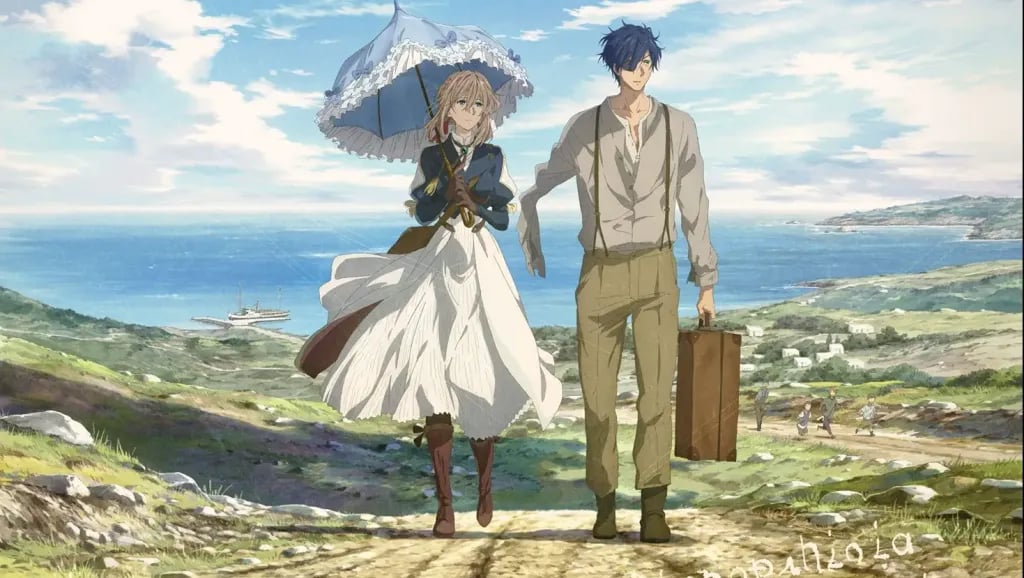Reflection on Violet Evergarden: The Movie
Explore the profound themes of longing, desire, and guilt in "Violet Evergarden: The Movie." Join us on a reflective journey through the emotional landscapes of the characters, as we delve into the intricate interplay of these emotions and their transformative power. Discover the timeless lessons and contemplative insights offered by this animated masterpiece.
MOVIE REFLECTIONPERSONAL REFLECTION
12/11/20233 min read


Reflection on Violet Evergarden: The Movie
Human emotions - intricate and profound, form the core of our experiences, shaping the narratives of our lives. In the realm of storytelling, few themes capture the complexity of human connections and internal struggles as powerfully as the interplay between longing, desire, and guilt. The animated masterpiece, "Violet Evergarden: The Movie," weaves a narrative tapestry that delves deep into the hearts of its characters, unraveling the poignant dynamics between the desire to see another person again and the haunting weight of guilt.
In this and my reflection on Violet Evergarden: The Movie, I want to explore the themes of longing, desire and guilt and how and why I saw it when I watched the movie.
The Longing Heart
The central character, Violet Evergarden, becomes the vessel through which this emotional exploration unfolds. Her longing to see the Major again serves as the emotional anchor of the narrative. The intensity of her desire transcends the adversities she faces due to the Major's commands. For Violet, the hardships endured are inconsequential compared to the prospect of reuniting with the Major, the person who has left an indelible mark on her life.
We need to note that during the course of the peace that followed after the war, Violet was under the impression that Gilbert is dead and she is living life to the best of her ability to understand what LOVE means.
It's always about love isn't it?
The resounding silence and emptiness in her heart guided her to explore the possibility and the what it means to have a heart that is full. She found the answer by creation connections with her colleagues at work and the people she met and made bonds with in effect to the line of work she does.
Now, despite having a taste of the experience of what it means to be connected and have an idea of what LOVE means, her longing to see the object of her love has grown all the more. It has become a desire that is starting to become unquenchable.
And what happens when there is the itch that cannot be scratched? Pain makes its way to the heart, and soon afterwards our protagonist starts to feel the emptiness yet again.
The Burden of Guilt
Conversely, the Major's or (Gilbert) response to the past events reveals the other side of this emotional equation. Burdened by guilt, he retreats into a secluded existence, crafting a life starkly different from the person he once was. The guilt he carries acts as a transformative force, compelling him to live in self-imposed exile, distancing himself from the very source of his remorse.
But what is stem of the guilt he's feeling? Putting Violet in a situation where it have taken her life.
The Dichotomy Explored
The dichotomy between longing and guilt presents a fascinating conundrum. Which force exerts a more powerful influence on the trajectory of an individual's life? Is it the magnetic pull of longing, drawing hearts across time and distance, or is it the heavy burden of guilt, shaping lives through penance and self-imposed isolation?
Balancing Act
Longing, with its connotations of hope and positive anticipation, propels individuals forward. It acts as a catalyst for change, inspiring actions and decisions that transcend the ordinary. The desire to see a loved one again becomes a driving force, navigating individuals through challenges, geographical distances, and even transformations of self.
On the other hand, guilt, with its oppressive weight, casts a long shadow on the human psyche. It becomes a silent companion, influencing choices and prompting individuals to seek redemption. The desire for atonement may lead to isolation, a form of self-imposed exile where one attempts to distance oneself from the perceived source of guilt.
The delicate balance between these emotions becomes a battleground for internal conflict. The desire to reunite may clash with the need for penance, creating a poignant tension within the characters. In this tug-of-war between opposing forces, the resolution often requires a journey of self-discovery, forgiveness, and acceptance.
Now, which emotional force is stronger: longing and desire or guilt?
Conclusion: Reflections on "Violet Evergarden: The Movie"
"Violet Evergarden: The Movie" delicately navigates this emotional terrain, offering audiences a glimpse into the human condition. It invites reflection on the enduring strength of connections, the transformative power of guilt, and the delicate dance between longing and redemption. The narrative serves as a mirror, prompting viewers to introspect on their own emotional landscapes, the echoes of longing and guilt resonating within.
In conclusion, the exploration of longing, desire, and guilt in "Violet Evergarden: The Movie" transcends the confines of animated storytelling. It becomes a canvas on which the intricacies of human emotions are painted with nuance and depth. Through the lens of this cinematic masterpiece, we embark on a reflective journey, contemplating the forces that shape our lives and the delicate interplay of emotions that define our very existence.
Check out my other writings, or photos & pictures or be home.